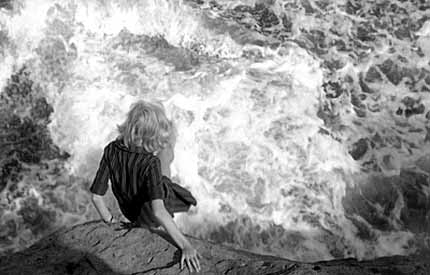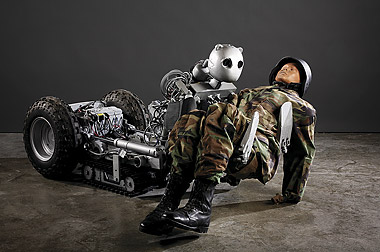Brought to you by Slusho, the fictitious product you’d like to bore into J.J. Abrams’s head Regarding Henry-style.
Farewell to Beauty

"In [L’Avventura] Antonioni stands quite apart from the Italian neorealists. He does not try to show life "as it is" but as he sees it. In the sense that his films are intensely personal in viewpoint and style and poetic rather than naturalistic, he is more comparable to Bergman than to his fellow Italians. But there is a great difference. The fountainhead of Bergman’s films is mysticism: is the God-man relation still viable? Antonioni seems to have answered that question in the negative; thinks men have to learn self-reliance or crumble; is hoping for the possibility of hope." – Stanley Kauffmann in The New Republic, February 20, 1961
The particular details of their atheism notwithstanding, Antonioni and Bergman are now inextricably linked. For those inclined to believe in a higher power, it’s as if God, upon snatching up Bergman’s soul, asked himself, "Hey, who was that other arthouse rascal that made a career out of denying my existence?", and claimed Antonioni, too. Good thing Rohmer’s a devout Catholic.
The absence of "hope" in Antonioni’s films did not deter him from reveling in beauty. As Jonathan Rosenbaum noted in his review of Beyond the Clouds, Antonioni was fascinated by the "erotics of flesh" and the "erotics of place" – and while he shot both "flesh" and "place" stunningly, there was nothing reassuring or even arousing about their relationship to one another. One was already inanimate; the other would be soon enough.
The spiritual desolation of Antonioni’s best work has unsettled me ever since I gave L’Avventura a shot based on Danny Peary’s recommendation in one of his Cult Movies books. Why L’Avventura and not Blowup? Well, I was sixteen at the time, and thought the idea of an "unexplained disappearance" would yield some manner of supernatural thrills; perhaps this was another Don’t Look Now waiting to be discovered! And while there was no mention of ghosts or killer dwarfs in Peary’s excellent appreciation (that I can recall – the books have sadly been out of print for many years), there was an impreciseness in his writing, an inability to pull everything together that made it seem as if he were haunted. Figuring that anything capable of inspiring such a baffling reaction was worthy of my attention, I rented the film from my well-stocked local video store and tried Antonioni on for the first time in my life.
Sixteen was way too early to make sense of what Antonioni was up to, and the cropped 4×3 presentation did no favors for the director’s precise compositions, but I was still struck by the disconnectedness of the characters. I was also shocked by the lack of sex; this was, after all, a movie (ostensibly) about a bunch of attractive folks stealing away on a yacht in the Mediterranean – with two particularly beautiful women, Monica Vitti and Lea Massari, in tow. Why wasn’t I turned on by any of this? And why, as the plot meandered along with the characters, wasn’t I bored out of my skull?
L’Avventura is a masterpiece of bracing futility, the ennui of its shallow leads captivating. As the film nears its second hour, our hope for any kind of conventional resolution vanishes as irrevocably as Massari, but we remain engaged. We are hoping for hope, searching for significance, looking for evidence of a divine hand in the characters’ lonely trek to nowhere. It never comes. And yet we keep watching, enjoying the distraction as we wait for our own flesh to rest in place. We will all recede in time.
And Antonioni is now background.
Restoring My Trust in God and Man
Though CHUD is the undisputed Internet Champion of Lists, the ScreenGrab gang is easily our number one contender. And they have outdone themselves with their latest Top Ten: "The Greatest Running Scenes in Movie History". I say this not because I agree with all of their selections (on the contrary, the omission of Gallipoli is inexcusable), but because they have linked to one of the most unexpected explosions of unabashed joy ever put to film. Ladies and gentlemen, I give you Denis Lavant in Leos Carax’s Mauvais Sang. (This moment is even more exhilarating in the context of the film, which you really need to see.)
You’re welcome.
While We’re On Lists
With a heavy heart, it’s time to revise my 10 Best Living Directors (based on overall contributions to the medium).
1. Jean-Luc Godard
2. Eric Rohmer
3. Brian De Palma
4. Steven Spielberg
5. Francis Ford Coppola
6. Martin Scorsese
7. Jules Dassin
8. Jacques Rivette
9. Tsai Ming-liang
10. Ridley Scott
And While You’re Screaming "De Palma over Spielberg, Coppola and Scorsese!?!?"
Geoff Beran at De Palma a la Mod is reporting that the master’s latest, Redacted, has been hailed as "intense, but very affecting". Beran’s source also claims, "It feels like the work of a young man". This is great news, as I’ve been concerned that De Palma’s first HD feature – which centers on disparate video diaries recounting a solitary incident between American soldiers and Iraqi citizens – might knock the director too far out of his comfort zone at an age when experimentation can be an act of desperation. I’m worried about Coppola’s Youth Without Youth for the same reason; after the failed development of Megalopolis, crafting what the director has termed a "student film" sounds dicey (especially for anyone who sat through endless reels of amateur noodling in college). Can these men adapt to guerilla-style filmmaking after decades of (mostly) studio-financed cushion?
I’m more hopeful for De Palma’s experimental foray because he’s filmed fast-and-loose to brilliant effect in the past (e.g. Greetings, Hi, Mom! and Home Movies). The last time Coppola went comparatively renegade was You’re a Big Boy Now – which, while a great little movie, was forty-one years ago! I get more of a working-just-to-work vibe from Youth Without Youth; hopefully, it’s a bridge to Megalopolis or On the Road. De Palma, meanwhile, seems to have a purpose. He’s an old radical; the bungled Iraq War is an opportunity to get righteously pissed off again. And a pissed off De Palma is a good thing for film. He’s got a great scream.
The Path to Victory
From the August issue of Harper’s: "The United States Army said it was developing a robot bear that will retrieve injured soldiers from the battlefield."
It looks like this:

It should look like this:
